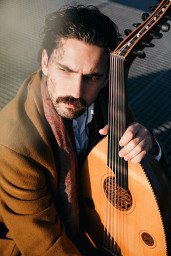Sepand Dadbeh
Perzische muziekles
Lesprijs
Locaties

en 1 andere locatie
en 1 andere locatie
Introduction
Beste allemaal, Ik help jullie graag Perzische muziek te leren. Laten we onze reis samen beginnen voor een prachtige ervaring met twee van de prominente instrumenten, Oud en Tanbour. Ook kunnen wij lessen krijgen over de theorie en geschiedenis van muziek. Welke is jouw keuze? Ik leer ook Nederlands, en ik ben nog een beginner, dus we kunnen samen communiceren, en ik leer ook Nederlands van jou :)
Bio:
Sepand Dadbeh is an Iranian multi-instrumentalist, troubadour, artistic director and producer.
He was born in 1992 and grew and flourished in a family of artists and musicians. At nine, he first took up music with Tombak, moving on to specialize in Oud and Tanbour under the supervision of some of the best musicians in Iran, such as Sohrab Pournazeri and Arsalan Kamkar. Sepand became a member of the Shams ensemble, led by maestro Kaykhosrow Pournazeri in 2011 while performing alongside great artists such as Sohrab and Tahmoures Pournazeri, Homayoun Shajarian, Alireza Ghorbani, and Antoni Rey.
He also graduated Bachelor of Arts in Music from Tehran University. He completed his MMus in World Music at the Codarts University of Rotterdam, where he also worked and studied in the field of Maqam music with maestro Kudsi Erguner as his educator. His musical collective "Jansouz" was named after the artistic name of his grandfather, a renowned maestro in the field of singing and the cultural history of Persian music. Since 2012, the Jansouz Collective has been creating and performing interdisciplinary forms of music related to the Iranian Cultural Civilization in collaboration with international musicians. As a troubadour, he strives to combine the musical self-discipline of ancient musicians with a novel understanding of modern times.
Sepand has had the privilege of collaborating with countless artists and experts worldwide in the past few years. Each project solidified his dual and concomitant passion for musical performance and cultural entrepreneurship, ultimately guiding his decision to pursue further his education in Cultural Economics and Entrepreneurship at Erasmus University Rotterdam. It is this very desire that, since 2015, has been the driving force behind his pursuit of a cultural organization as "Persiart," which he founded in Paris and has been dedicated to the interdisciplinary study of the arts. As a director of the organization, he has sought to create a multidisciplinary approach that has enabled the organization to host several delegations to engage in cross-cultural dialogue and musical performances.
Oud/Ud
To become a skilled oud player, it is essential to learn one of the oud playing styles. These lessons will focus on the Iranian oud playing style, which boasts a vast repertoire from Maqam music to Dast-Gah music. Alongside ear training and reading music scores, we will excitingly elevate your playing technique, enabling you to perform a variety of pieces from the masters of this music style. While the oud has a long and diverse historical past, our approach will be thoroughly contemporary, ensuring that you can connect with this instrument in a modern and engaging way. Send me a message to start now!
Tanbour
Playing Tanbour is a journey into the heart of Sufi and mystical thought. This instrument demands a high level of technique, Sonority, and Musicality, allowing you to connect deeply with the music and touch your audience's soul. I will guide you through a contemporary approach to playing Tanbour, including improvisation and composition, through a series of classified pieces and exercises. Get ready to be inspired and to inspire others with the epic power of the Tanbour.
Apply now!
Music Theory Lessons (cognitive approach in the practice of Persian Music)
Music appreciation is designed to teach students how to understand and describe the contexts and creative processes involved in music composition, recognize what is being heard and what to listen for, and understand sound and melody. What is the time signature? What instruments are being played? What are you feeling while listening to this piece, and why? The term "appreciation" has roots in philosophy, described in this context as the understanding of the value and merit of different styles of music. Our primary focus for this method is a cognitive approach to the practice of Iranian Cultural Civilisation, known as Persian Music. Let's start our lesson now!
EDUCATION
2011 - 2015 | Bachelor of Arts (Iranian Music); Faculty of Fine Arts, University of Tehran
2018 - 2020 | Master of Music (World Music); Codarts Rotterdam, University of the Arts
2021 - 2023 | Master of Cultural Economics and Entrepreneurship; Erasmus University Rotterdam
TEACHING EXPERIENCE
2014 - Now | Oud and Tanbour
2010 - Now | Music Theory & History
Perzische muziekles
A Journey into the Iranian Music Modal System - Oud, Tanbour, and Music Theory Lessons (cognitive approach in the practice of Persian Music)
Music is the best skill and tool for traveling to different times and places! Thus, I would like to invite you on an exquisite adventure.
Oud and Tanbour are two prominent instruments from the family of stringed instruments that give you the ability to perform a type of music (Gahan music) that we know as Modal/ Maqam music to Dast-Gahi music from the past centuries until today.
Our comprehensive approach to this music system, spanning from Central Asia to the Mediterranean, ensures that you will gain a deep understanding of this rich civilization. Through inspiring and amusing lessons, we will cover ear training, reading music scores, techniques, and music theory and history. And, most importantly, you will have the opportunity to develop your playing skills by making music together.







